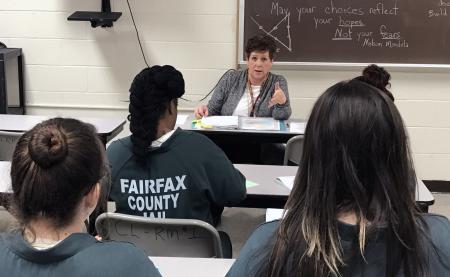The Sheriff's Office offers a wide variety of programs for inmates to better themselves during their incarceration and prepare them for future success once they are released from our jail. While some inmates are court-ordered into programs, the majority voluntarily take positive steps toward self-improvement. Most of our programs focus on education and skills development. Inmates can find constructive ways to enhance current skills, learn new skills, redefine their problem solving approaches or just reinforce positive values. Learn more about these enrichment programs.

Education
People arrive at the ADC with a wide range of educational levels, from little or no formal schooling to advanced college degrees. Some inmates are unable to read and write, and others come just shy of completing 12th grade. Regardless of their previous educational experiences and learning levels, inmates without a diploma or equivalency are eligible for education programs through our partnership with Fairfax County Public Schools (FCPS).
Inmates who test below a 4th grade proficiency can gain basic literacy skills in a class with an FCPS teacher and/or a volunteer. The goal is to integrate life skills with literacy. For example, math is about managing money; reading focuses on signs, maps and newspapers; and writing helps the learner complete applications and on-the-job paperwork.
Inmates who are 18-21 years of age and enter the ADC with an Individualized Education Program (IEP) can continue to work on their high school diploma through the Interagency Alternative School program.
Without an IEP, inmates of any age and working above a 4th grade proficiency are placed on an academic track to build the skills necessary to pass the GED exam. For inmates whose primary language is Spanish, we offer Pre-GED and GED classes in Spanish.
The GED tests offered inside the ADC are the same as what is available on the outside. Our jail-based education team helps inmates transition to the GED or Alternative School programs on the outside if they are released before attaining their high school credentials.
Skills Development
Inmates may take advantage of a variety of programs to build employability and workplace skills, learn keyboarding and practice financial planning. They can also take part in self-improvement classes and programs that teach responsible parenting, anger management and the impact of crime. Learn more about how we offer these enrichment programs.
Resource Fairs
Prior to the COVID-19 pandemic, the Sheriff’s Office held an Inmate Resource Fair every year to help inmates connect with the private and public community resources they would need upon release from the ADC. More than 20 vendors representing housing, employment, insurance, health care, education, and legal resources would provide information to inmates who circulated through each fair in small groups throughout the day.
Library
Providing the opportunity for inmates to learn, grow, and imagine through literary doorways is the overall goal of the ADC library. The lending library is where books are stored and categorized by genre. The staff librarian and two workforce inmates put selected books on mobile carts and visit every cell block at least once a week for delivery and collection.
Religious Services and Programs
The Chaplain’s Office provides and coordinates religious services, classes, programs, and mentoring to meet the spiritual needs of a diverse inmate population. Inmates are permitted and encouraged to practice their respective religions, as long as doing so does not intrude upon the rights of others or pose a threat to the order and security of the ADC. Weekly religious services include Protestant worship and Catholic mass – in both English and Spanish – Korean bible study, and Islamic Jumu’ah and Talim.
Recreation
Every day, inmates are offered at least one hour of recreation time in one of 14 designated gyms. Each gym provides an opportunity for individual and group exercise, including volleyball. The two main gyms have cardio rooms with treadmills and other machines to facilitate cardiovascular fitness. Outside gyms are available as weather and staffing permits.
Yoga
Prior to the COVID-19 pandemic, the ADC offered weekly yoga classes taught by a volunteer who is an experienced yogi. In an assessment of the first seven months of the yoga program, the Sheriff’s Office found an 84 percent reduction in the number of jail offenses committed by inmates enrolled in the class and a 77 percent reduction in the number of violators. The classes were so successful that businesses donated supplies, including yoga mats and class props, in support of the program.

